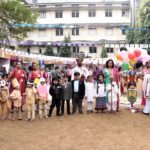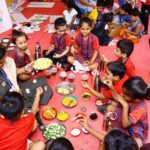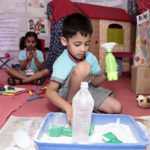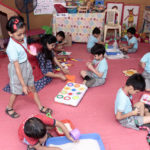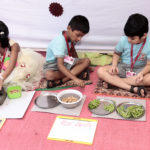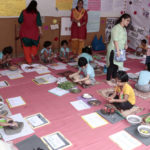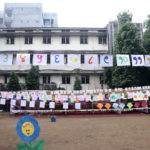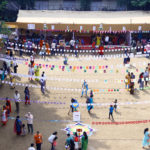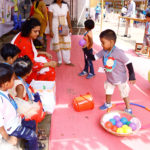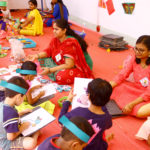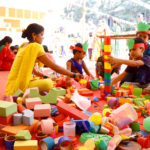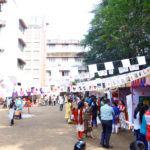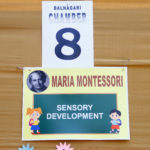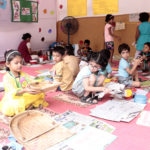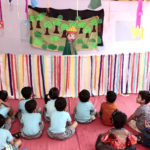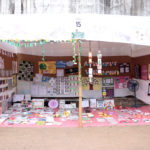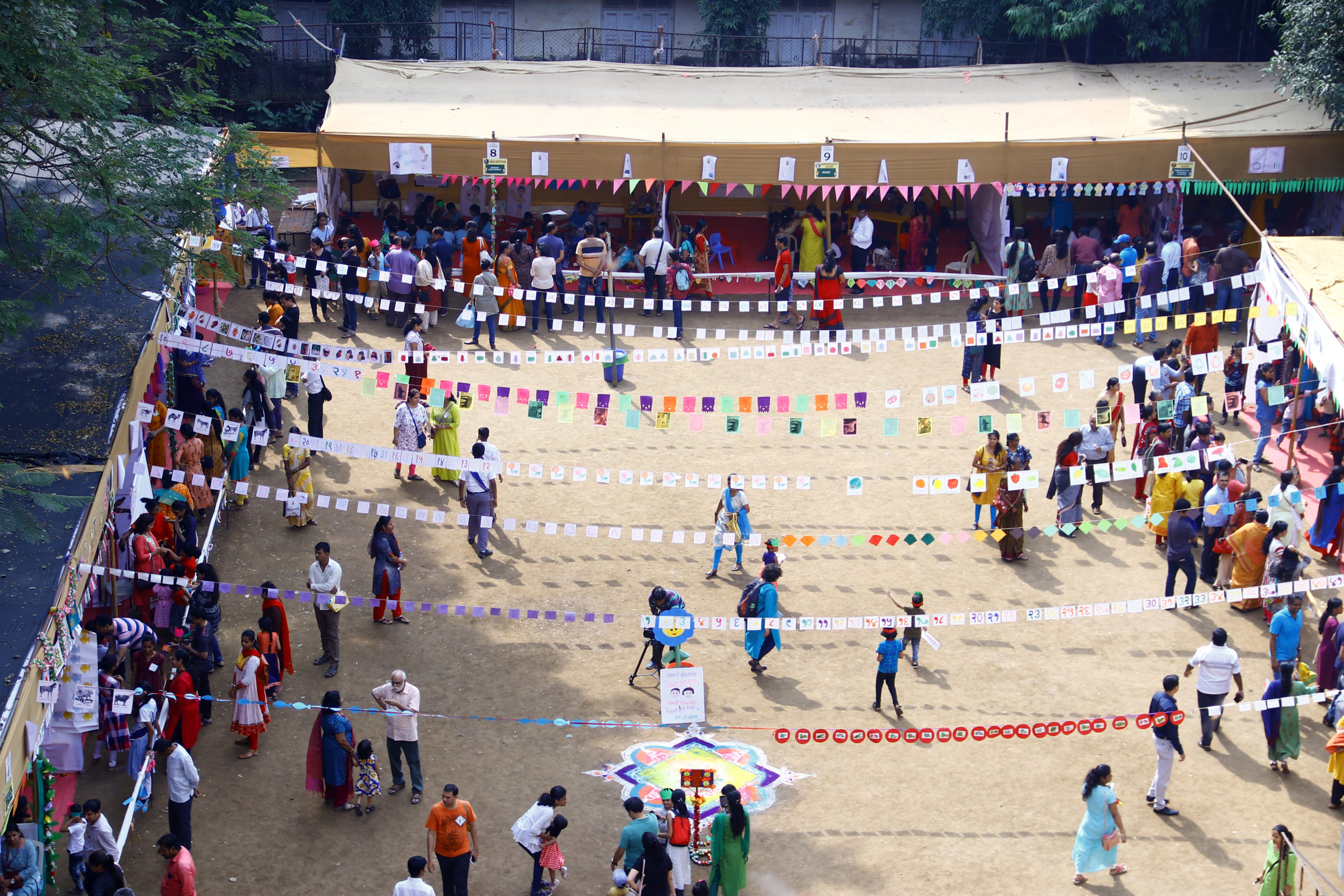
An innovative Initiative by Saraswati Mandir Trust | Vishakha Deshpande, India
Balnagari – The Seeding Edufest, Thane India
Contributed by Vishakha Deshpande
Today’s world is full of stress. Even the pre-school kids are not spared from this stress. Not every where there is conducive atmosphere for children to bloom. Parents have to fulfill multiple tasks in their lives and kids spend a little time of the day in school.
With a view of propogating and creating awareness about the scientific, research based, stress less and joyful methodologies in education within the society and by and large with the parents, grandparents, and educators, Saraswati Mandir Trust, Naupada, Thane, India had organized a two days grand education fair, ‘Balnagari – The Seeding Edufest’(Balnagari means ‘Children’s Town’). This was organized jointly by the English and the Marathi medium( regional language) pre-elementry sections on 30th Nov’19 and 1st Dec’19. Both the section heads Mrs Vishakha Deshpande and Mrs Rati Bhosekar spear
headed this initiative with a strong support of the management. Balnagari was organized on the school ground, with 15 chambers separately arranged for activities of all the developmental and learning domains. View the photos below by clicking on the picture you want to see and selecting the arrows at the bottom to scroll through all the photos.
There was demonstrative array of fun filled and joyful activities related to language, Mathematics and logical thinking, World around us and science, sensory development, pre-reading to reading, pre-writing to writing, motor development activities, free play, music, puppetry , dance and activities of daily living too.
Dr. Romila Soni who is the head of the Early childhood education department in National Council for Education Research and Training (NCERT), New Delhi did the honor of inaugurating the Edufest ‘Balnagari’. For the inauguration ceremony, some pre-school kids had dressed up as five sensory organs and the renowned educationist like Fredrick Frobel, Maria Montessory, Jean Piaget, Noam Chomsky, Tarabai Modak, Anutai Wagh, Mahatma Gandhi, Ravindranath Tagore Jawaharlal Nehru, Gijubhai Badheka and Rudolf Stiener.
Each chamber was given an apt name of these Educationists’s who have left a significant mark in that particular area of Early childhood learning. Saraswati school’s pre-primary children along with these invited children were divided into 12 groups of 10 children each and they were engaged in fun filled activities in all the 15 chambers at a time simultaneously. There were also common activity chambers for the outside children who were visiting the balnagari with their parents, guardians and teachers.
Each chamber had an array of activities equipped with lots of handmade teaching –learning material for the children to practically handle and construct their own knowledge. Children learned as they played these games. These activities gave them opportunities for language development through listening and speaking in the Tarabai Modak chamber. In the Noam Chomsky Chamber one could experience how pre-reading activities gradually lead to effective reading. Creative and pre-writing activities in the Jawaharlal Nehru chamber revealed how these skills help kids to develop their fine motors. In the Maria Montessori chamber, sensory development activities gave them complete experience to use their sense organs to know their surrounding world in much better way. Jean Piaget chamber of Logical mathematical activities had a treasure of lots of hands on experiences to understand concepts like tens and units, classification, fractions, basic operations and many other pre-number concepts. Lots of challenging puzzles were provided here which kept the children engrossed. Anutai Wagh chamber of Science and World around us had a variety of exposure to natural resources and science experiments. Children were seen enjoying the experiments and exploring the available material. Gijubhai Badheka chamber for free play had a vast collection of blocks, natural resources, waste and throw away material and loose parts, which gave children great pleasure to invent their own play. This chamber was evident to understand the fact that “Children do not need toys, they need play” and Play is the universal language of children. Friedrich Froebel outdoor spaces provided lots of games in the open area to enhance the gross motor skills.
The most popular chamber with a vast array of activities was the Mahatma Gandhi chamber of Activities of daily living. Here, activities which children normally do not get to do but in fact they ought to, were arranged for them to develop their motor skills. Children thoroughly enjoyed doing activities like grating, mashing, peeling, slicing, cleaning leafy vegetables, cutting, grinding, pounding, sieving, churning, thrashing, sweeping, kneading the dough and rolling rotis etc.
Fred Roger Puppetry Chamber was a hit too. Trainee teachers of Early Childhood Education from the B. M Nanavati college of Home science Ghatkopar, conducted fantastic fun filled puppet shows which the children thoroughly enjoyed. They also enjoyed handling the puppets and knowing more stories through the shows. Rudolf Steiner chamber of Dance and Ravindranath Tagore music chamber also invited a lot of crowd to witness how children thoroughly enjoyed the body movements to rejuvenate their brain. Friedrich Froebel outdoor spaces provided lots of games in the open area to enhance the gross motor skills.
The two days grand education festival had around 1500 people visiting from all parts of Maharashtra. Groups of teachers, educators, curriculum developers, Heads of educational Institutions, Counselors, psychologists, parents and grand parents and lots of children were seen pouring inside the ‘Children’s town’ to witness, experience, enjoy the whole fun of a Developmentally Appropriate, scientific and research based methodologies of Early Childhood Education, which all the children rightfully deserve.


